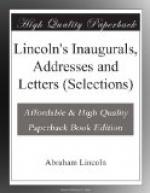I allude to this extraordinary matter in this canvass for some further purpose than anything yet advanced. Judge Douglas did not make his statement upon that occasion as matters that he believed to be true, but he stated them roundly as being true, in such form as to pledge his veracity for their truth. When the whole matter turns out as it does, and when we consider who Judge Douglas is,—that he is a distinguished Senator of the United States; that he has served nearly twelve years as such; that his character is not at all limited as an ordinary Senator of the United States, but that his name has become of world-wide renown,—it is most extraordinary that he should so far forget all the suggestions of justice to an adversary, or of prudence to himself, as to venture upon the assertion of that which the slightest investigation would have shown him to be wholly false. I can only account for his having done so upon the supposition that that evil genius which has attended him through his life, giving to him an apparent astonishing prosperity, such as to lead very many good men to doubt there being any advantage in virtue over vice—I say I can only account for it on the supposition that that evil genius has at last made up its mind to forsake him.
And I may add that another extraordinary feature of the Judge’s conduct in this canvass—made more extraordinary by this incident—is, that he is in the habit, in almost all the speeches he makes, of charging falsehood upon his adversaries, myself and others. I now ask whether he is able to find in anything that Judge Trumbull, for instance, has said, or in anything that I have said, a justification at all compared with what we have, in this instance, for that sort of vulgarity.
I have been in the habit of charging as a matter of belief on my part, that, in the introduction of the Nebraska bill into Congress, there was a conspiracy to make slavery perpetual and national. I have arranged from time to time the evidence which establishes and proves the truth of this charge. I recurred to this charge at Ottawa. I shall not now have time to dwell upon it at very great length; but, inasmuch as Judge Douglas in his reply of half an hour made some points upon me in relation to it, I propose noticing a few of them.
The Judge insists that, in the first speech I made, in which I very distinctly made that charge, he thought for a good while I was in fun!—that I was playful—that I was not sincere about it—and that he only grew angry and somewhat excited when he found that I insisted upon it as a matter of earnestness. He says he characterized it as a falsehood as far as I implicated his moral character in that transaction. Well, I did not know, till he presented that view, that I had implicated his moral character. He is very much in the habit, when he argues me up into a position I never thought of occupying, of very cozily saying he has no doubt Lincoln is “conscientious”




